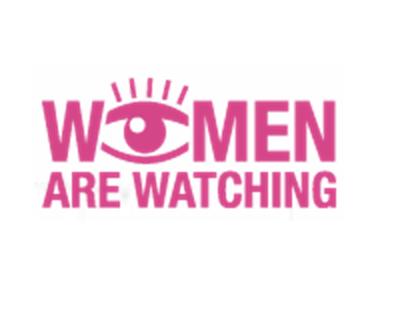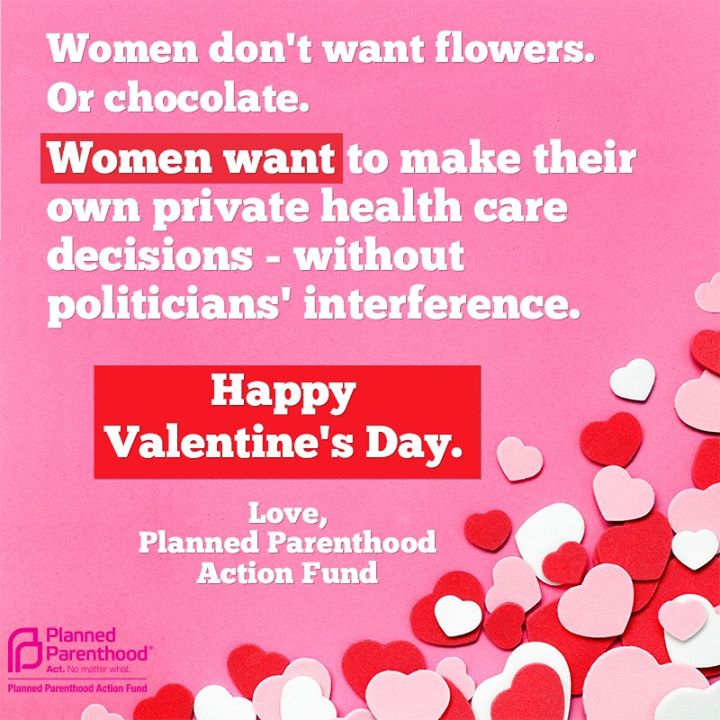Planned Parenthood stand with “women.” Assumedly this means something.
It cannot mean that Planned Parenthood — in their actions, goals, and professed beliefs — stand for the all-inclusive category of “every human person with two “x” sex chromosomes.” 57% percent of women are in favor of abortion being illegal in all or most circumstances (20%, 37%, respectively). Planned Parenthood — who daily bemoans laws limiting abortion, manufacturing a menagerie of pink graphics protesting any and all proposed restrictions on the business — cannot include in their category of “women” the majority of American women. They cannot take an institutional “stand” with women if the majority of women do not “stand” with them — except in the manner of an aggressive, ideological photo-bomb, “standing with women whether they like it or not.”

If Planned Parenthood are going to be factual about which women they “stand with,” “support” and “trust,” their category of “women” must mean “the 43% of women who are not directly opposed to our demand for increased access to abortion.” But they do not make this distinction. They speak for “women” in general. As in…
 Since they make no distinction between their category of “women” and the living, breathing women going about their day-to-day adventures, I have to charitably assume that they are making reference to an idea of women, one that transcends particular women — who are more likely to identify themselves with pro-life positions.
Since they make no distinction between their category of “women” and the living, breathing women going about their day-to-day adventures, I have to charitably assume that they are making reference to an idea of women, one that transcends particular women — who are more likely to identify themselves with pro-life positions.
Standing for an idea is a fundamental human pose, one taken across all political boundaries, as when the married woman stands for “the idea of marriage” — an idea transcendent of particular marriages, which often suck — or when the atheist defends the idea of the scientific, rational atheist over and against the particular atheists who operate on Reddit.
Planned Parenthood, in their incapacity to stand for women as particulars must stand for women as an idea. This is hardly a reason to dislike the kids. I merely want to point out an obvious consequence of their actions. If I say, “I want to stand up for Catholics in opposition of the death penalty in our country” and a nominal Catholic protests “But I support the death penalty!” it falls to me to make a decision about my category of “Catholic.” I must clarify in some awkward but nevertheless necessary manner, “Look, by Catholics I am referring to those faithful to the teachings of the Church.” I must define the boundaries of my category. I must carve out the borders of my idea.
This applies to everyone. Insofar as you going to elect yourself as a champion of an idea, it falls to you to determine the boundaries of that idea — who fits it and who doesn’t. Furthermore, every representation of that idea takes on a light of extreme significance by containing an implicit demand. If I am representing the idea of a Christian, I cannot say “the Christian is compassionate to the marginalized” without implicitly making the claim that the particular Christian ought to be compassionate. If I am representing the idea of a man, I cannot say “a man doesn’t back down from a fight” without implicitly making the claim that particular men, going about their real, daily lives, ought not back down from fights. Insofar as I am defining the boundaries of my idea, determining who fits and who doesn’t, I am implicitly claiming that those who don’t fit ought to — if they are going to claim to be part of my idea.
Planned Parenthood, in using the term “women” — and insofar as they are not simply lying, claiming the actual, universal support of all particular women — must be referring to an idea, and insofar as they represent an idea, they are responsible for deciding the parameters of their idea — of determining which particular women fit their idea of “women” — and which do not. Thus all Planned Parenthood’s various representations of the “women” they support implicitly carry an ought, a demand upon particular women to — insofar as they want to fit under the category of “women” — conform to their parameters. This is hardly controversial. When Planned parenthood speak for “women,” saying…
…they imply that all particular women ought to speak in like manner. When Planned Parenthood depict women — whether in advertisement, Facebook graphic, or universal statement like “women have a right to decide what goes on in their own bodies” — they are implicitly defining the borders of a category, saying what women ought to be — if they are to fit the category of “woman.” If their portrayal of women is of healthy, self-determined, powerful individuals in charge of their own destiny, they are implicitly making the claim that particular women ought to participate in these traits.
If this true — and I think it is, the only alternative being that Planned Parenthood are entertaining the delusion that 100% of particular women appreciate them — the question becomes, “How does Planned Parenthood define their idea of women?”
Unfortunately, the answer has recently been — “as a weak, dependent, incapable and mono-chromed creature.” I am not so foolish as to believe this is intentional. I do not doubt that the folks pouring over which shade of white works best with pink like women and desire that they thrive like Lebanon cedars. No, this lameness is the fruit of the fact that Planned Parenthood are working to establish a narrative within which their political demands achieve their highest possible level of public appeal. Women are made to look like invertebrate victims, not because those artisans of ideology believe this of women, but because placing women in the position of an invertebrate victim serves the higher cause of convincing a public to support the goals of Planned Parenthood. A healthy idea of women is an unintentional casualty of Planned Parenthood’s war for political victory.
In the next section, we’ll take a gander at what this idea is, where it comes from, and what it demands of particular women. Till then, stay in school.











